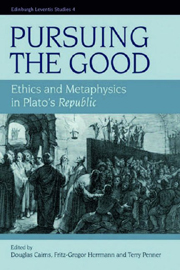Book contents
- Frontmatter
- Contents
- Preface
- Contributors and Editors
- Introduction
- 1 What is the Form of the Good the Form of? A Question about the Plot of the Republic
- 2 Glaucon's Challenge, Rational Egoism and Ordinary Morality
- 3 Thrasymachean Rulers, Altruistic Rulers and Socratic Rulers
- 4 Neutralism in Book I of the Republic
- 5 The Good, Advantage, Happiness and the Form of the Good: How Continuous with Socratic Ethics is Platonic Ethics?
- 6 The Form of the Good and the Good in Plato's Republic
- 7 Flourishing: The Central Concept of Practical Thought
- 8 Is Plato's Conception of the Form of the Good Contradictory?
- 9 The Good, Essences and Relations
- 10 The Idea of the Good and the Other Forms in Plato's Republic
- 11 The Aporia in the Charmides about Reflexive Knowledge and the Contribution to its Solution in the Sun Analogy of the Republic
- 12 The Good and Mathematics
- 13 The Good and Order: Does the Republic Display an Analogy Between a Science of Ethics and Mathematics?
- 14 Inquiry and Justification in the Search for the Highest Good in Plato and Aristotle
- 15 The Carpenter and the Good
- 16 Conversion or Conversation? A Note on Plato's Philosophical Methods
- Index
6 - The Form of the Good and the Good in Plato's Republic
Published online by Cambridge University Press: 12 September 2012
- Frontmatter
- Contents
- Preface
- Contributors and Editors
- Introduction
- 1 What is the Form of the Good the Form of? A Question about the Plot of the Republic
- 2 Glaucon's Challenge, Rational Egoism and Ordinary Morality
- 3 Thrasymachean Rulers, Altruistic Rulers and Socratic Rulers
- 4 Neutralism in Book I of the Republic
- 5 The Good, Advantage, Happiness and the Form of the Good: How Continuous with Socratic Ethics is Platonic Ethics?
- 6 The Form of the Good and the Good in Plato's Republic
- 7 Flourishing: The Central Concept of Practical Thought
- 8 Is Plato's Conception of the Form of the Good Contradictory?
- 9 The Good, Essences and Relations
- 10 The Idea of the Good and the Other Forms in Plato's Republic
- 11 The Aporia in the Charmides about Reflexive Knowledge and the Contribution to its Solution in the Sun Analogy of the Republic
- 12 The Good and Mathematics
- 13 The Good and Order: Does the Republic Display an Analogy Between a Science of Ethics and Mathematics?
- 14 Inquiry and Justification in the Search for the Highest Good in Plato and Aristotle
- 15 The Carpenter and the Good
- 16 Conversion or Conversation? A Note on Plato's Philosophical Methods
- Index
Summary
THE GOOD AND THE GOOD: THE LARGER PICTURE
This chapter addresses a topic that everyone will agree in locating at the very centre of Plato's philosophy: his conception of the good. However I propose to address the topic from a perspective which, for at least some readers, will appear an unusual one. The standard view, at any rate in Anglophone circles, is that the treatment of ‘the form of the good’ in the Republic, and in consequence perhaps the Republic itself, represent a new departure for Plato. According to this view, the Plato of the Republic differs significantly from the Plato of that set of dialogues that the same Anglophone scholars are in the habit of describing as ‘early’, or ‘Socratic’: this later Plato, the one of the Republic, is a metaphysician, as he – and his main character, Socrates – were not before; and the approach to ethical philosophy they use is also different. That is, the Plato of the Republic is a believer in forms, of a distinctively Platonic sort (existing independently of the human or even the divine mind, outside time and space, different from but somehow causative of corresponding sensible particulars, and so on); and he is a proponent of a kind of good – the form of the good – that is significantly different from the good that the Socrates of the ‘Socratic’ dialogues continually insists that we need to get knowledge of, along with knowledge of its opposite, the bad. That good is the good of each of us, our happiness.
- Type
- Chapter
- Information
- Pursuing the GoodEthics and Metaphysics in Plato's Republic, pp. 124 - 153Publisher: Edinburgh University PressPrint publication year: 2007



